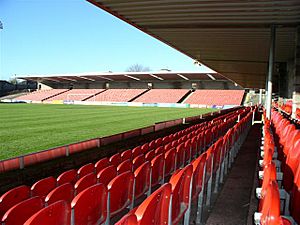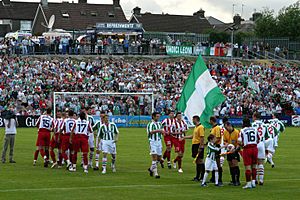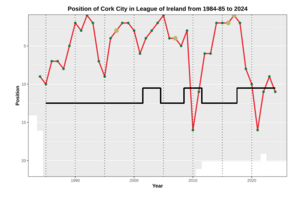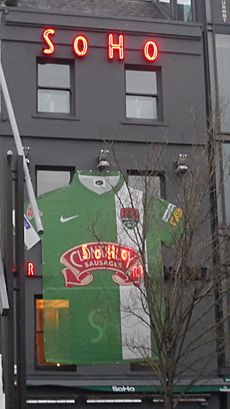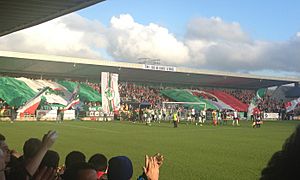Cork City F.C. facts for kids
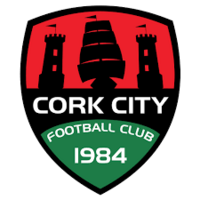 |
|||
| Full name | Cork City Football Club | ||
|---|---|---|---|
| Nickname(s) | Rebel Army, City | ||
| Founded | 1984 | ||
| Ground | Turners Cross | ||
| Capacity | 7,485 | ||
| Owner | Dermot Usher | ||
| Manager | Gerard Nash | ||
| League | League of Ireland Premier Division | ||
| 2024 | League of Ireland First Division, 1st of 10 (promoted) | ||
|
|
|||
Cork City Football Club is an Irish football club located in Cork. The club started in 1984 and joined the League of Ireland.
Cork City was one of the first clubs in Ireland to have professional footballers. This helped the club grow. With improvements to their home stadium, Turners Cross, and a change to playing games in the summer, Cork City became one of the biggest and most popular clubs in Ireland. A survey in 2020 showed they had the most supporters among League of Ireland clubs.
Cork City won its third League of Ireland Premier Division title in the 2017 season. They also won the FAI Cup that year, achieving a "double" victory. As of the 2025 season, the club plays in the League of Ireland Premier Division. They earned this spot by winning the 2024 League of Ireland First Division title.
The club's main colours are green and white with red details. Their badge is based on the Cork city coat of arms. Cork City plays its home games at Turners Cross.
Contents
Club History
Early Days Before 1980
The name Cork City was used by other football teams before the current club. In the 1920s, teams called Cork City played in local leagues and cups. Another team named Cork City F.C. also played in the League of Ireland from 1938 to 1940.
Starting Strong in the 1980s
After a club called Cork United went out of business in 1982, senior football returned to Cork. The new Cork City FC was formed in 1984. People from other Cork clubs helped create it. The new club was then accepted into the League of Ireland. Bobby Tambling was the first manager, but Tony 'Tucker' Allen took over after only 13 games.
In its first two seasons, the club almost got moved down to a lower division. They didn't win any home games at Flower Lodge but avoided relegation by a small difference in goals. The club reached the semi-finals of the FAI Cup but lost to Shamrock Rovers. This was the last game played at Flower Lodge.
In 1986, the club moved to its new home, Turners Cross. New manager Noel O'Mahony helped Cork finish in the middle of the league table. The next year, former Ireland player Eamon O'Keefe became manager. He led the team to win the Munster Senior Cup and the League of Ireland Cup. These were the club's first national trophies.
By 1988, O'Mahony was back as manager. The team finished eighth in the league. They lost to Derry City in the FAI Cup final. This loss, however, earned them their first chance to play in a European competition. Torpedo Moscow knocked them out of the 1989–90 European Cup Winners' Cup. Still, City finished fifth in the Premier Division and won the Munster Senior Cup again.
 |
Successes in the 1990s
The early 1990s were a great time for Cork City. They had long periods without losing in the league. They also finished high in the league and won the Munster Senior Cup four years in a row. The club played several games in European competitions. A famous European game was against Bayern Munich in the UEFA Cup. City drew 1-1 at home before losing 0-2 in Germany.
In 1993, Cork City won the League of Ireland Premier Division title for the first time. This happened after a special three-team play-off. Manager O'Mahoney left, and the club moved to a new stadium in Bishopstown.
Damien Richardson became the new manager. The 1993/94 season started with City beating Welsh team Cwmbran Town in the UEFA Champions League. They came back from being three goals down to win. In the next round, they lost closely to Turkish team Galatasaray. City finished second in the league that year.
The 1994/95 season was mixed for Cork City. They started well, but money problems forced Richardson to leave. The Bishopstown stadium wasn't ready, so games were played in different places. Noel O'Mahony returned as manager, but the team's chance at the title ended. However, they did win the Munster Senior Cup and League of Ireland Cup that season.
At the start of the 1995/96 season, Rob Hindmarch took over. The club was in serious trouble because of stadium costs. A new board was put in place, and the club moved back to Turners Cross. With little money, Hindmarch struggled, and the team was in danger of being moved down a division. After losing in the FAI Cup, Dave Barry became manager. The team finished ninth in the league. For the first time in five years, City lost the Munster Cup.
In 1996/97, City finished fourth. They also lost narrowly in the League Cup to Galway United. More fans started coming to games, and the Munster Senior Cup was won again. The next season, Cork did well in the InterToto Cup and finished third in the league. Dave Barry's best moment was winning the 1998 FAI Cup. Cork started the next season with eight wins in a row. But they finished second after losing three times to champions St Patrick's Athletic. After finishing second again in 1999/2000, Barry left. Colin Murphy replaced him.
The 2000s: New Ownership and League Titles
Colin Murphy left quickly after one game to join Leicester City. Derek Mountfield replaced him but lasted less than a season. Former player Liam Murphy then took over. Under Murphy, City had a 13-game unbeaten run. This earned them a spot in the Intertoto Cup and their tenth Munster Cup win.
In 2001, there was a plan for City to work with English club Leicester City. Fans protested, and the plan did not happen. Also in 2001, the club's directors stepped down. Businessman Brian Lennox took control and led the club into a professional era.
The year 2002 was a time of change. Several older players who had been important in the 1990s left the club. Younger players like George O'Callaghan, John O'Flynn, and Dan Murray joined the team.
In February 2003, Pat Dolan became the new manager. He led City to third place in the league. Dolan's second season was also good. City beat Malmö FF and NEC Nijmegen in the Intertoto Cup. They also finished second in the league.
Dolan was replaced by former manager Damien Richardson in 2005. In 2005, Richardson led Cork City to their second league championship. They won on the last day of the season with a 2-0 victory over Derry City. In the same year, Cork City finished second in the FAI Cup.
In 2006, more work began at Turners Cross. City played against Apollon Limassol and Red Star Belgrade in the UEFA Champions League. The club lost to Drogheda United in the Setanta Cup Final. They finished fourth in the league and earned a spot in the Intertoto and Setanta Cup.
At the start of the 2007 season, two new players could not play because of rules. This led to an inconsistent start to the season. They were knocked out of the Setanta Cup. In August 2007, Roy O'Donovan moved to Sunderland for a record fee of €500,000 for a League of Ireland player. In 2007, the club's ownership changed. Brian Lennox sold it to a company called "Arkaga." Even with an FAI Cup win, manager Damien Richardson left the club.
In January 2008, Alan Mathews became manager. The club signed several new players. City was knocked out of European competition early by FC Haka. City finished fifth in the league. However, the club won the Setanta Sports Cup by beating Glentoran. Off the field, the club faced big problems. In August 2008, due to money issues with Arkaga, the club went into a special financial process. With debts of €800,000, they had to cut costs. The club also lost 10 points in the league. In October 2008, Tom Coughlan took over the club.
Paul Doolin replaced Mathews as manager for the 2009 season. The team had good results early in 2009. They even beat Roy Keane's Ipswich Town 2-0. Despite these results, the club's future was uncertain due to unpaid taxes. A court order was issued to close the club. After several delays, the club managed to pay its taxes just in time. Doolin left at the end of 2009. He had led the club to a third-place finish in the 2009 League of Ireland Premier Division.
The 2010s: Supporters Take Over and New Trophies
Financial problems from 2008 and 2009 continued into the new decade. Roddy Collins became manager before the 2010 season. Pressure on owner Tom Coughlan led to his resignation. The club's place in the Premier Division was also uncertain. This was because of licensing decisions and unpaid taxes.
Despite efforts to save it, the club could not get a license. This meant a new owner could not be found, and the court ordered the old company to close. Cork City fans started a new company called Cork City FORAS Co-op. They entered the 2010 League of Ireland First Division. The club's original name, Cork City FC, was restored on June 1, 2010. A supporters' trust, FORAS, bought the rights to the name. The team continued to play as Cork City FORAS Co-op for the rest of the season. However, most people still called them Cork City FC.
Tommy Dunne became the first-team manager. He managed the 2010 season. Several players were chosen to play for Ireland's U23 and U21 teams. Shane Duggan and Graham Cummins were named in the PFAI First Division Team of the Year. Cummins also won the PFAI First Division Player of the Year award. He was the joint top-scorer in the First Division with 18 goals. Cork finished sixth in the First Division in 2010.
In 2011, the club won the First Division on the last day of the season. This meant they were promoted to the Premier Division. The team also reached the league cup final but lost to Derry City. The club was knocked out of the 2012 FAI Cup by Shamrock Rovers. They finished sixth in the 2012 Premier Division.
Poor results at the start of the 2013 season led to Tommy Dunne being replaced as manager by August. Stuart Ashton managed for the rest of the season, and the team finished sixth. Former player and record scorer John Caulfield became manager in 2014. His team had long unbeaten runs. They pushed league-leaders Dundalk for the title. However, despite taking the title race to the final day, Caulfield's team finished second in the 2014 Premier Division. The club also finished second in the 2015 season, again behind Dundalk. This earned them a spot in the UEFA Europa League qualifying rounds. They reached the third round, their best European result since 1997. For the third year in a row, Cork City finished second to Dundalk in the 2016 Premier Division. However, in November, they beat Dundalk in the 2016 FAI Cup final. Sean Maguire scored a goal in extra time to win Caulfield his first major trophy as manager.
The 2017 season started with a 22-game unbeaten run. However, some less favorable results and the departure of top-scorer Sean Maguire meant the championship win was delayed. Cork City were named 2017 League of Ireland Premier Division champions on October 17, 2017. They still had several games left to play. The club then won its first league and cup "double" by winning the 2017 FAI Cup Final a few weeks later.
City started 2018 by winning their third President's Cup final in a row against Dundalk. This game was special because former player Liam Miller had passed away earlier that February. Like the previous four seasons, Dundalk was Cork's main rival in the 2018 League of Ireland Premier Division and 2018 FAI Cup. Dundalk ended up winning both.
A series of poor results at the start of the 2019 season led to John Caulfield leaving as manager. Neale Fenn took over in August 2019. Cork City finished the 2019 season in eighth place. They had only 9 wins and 37 points.
The 2020s: Ups and Downs
With five games left in the 2020 season, and the club at the bottom of the table, Neale Fenn was replaced by Colin Healy. The club was moved down to the League of Ireland First Division on October 24, 2020. This happened after their last-place finish was confirmed.
In late October 2020, the supporters' trust agreed to sell the club to Preston North End owner Trevor Hemmings. However, in mid-December 2020, the sale did not go through. This was because the company could not agree on a lease for Turners Cross. Hemmings, who had helped Cork City before, passed away in 2021. The club played in the 2021 season and finished sixth. This was not enough to get promoted back to the Premier Division.
After winning the 2022 LOI First Division title in October 2022, the club was promoted back to the Premier Division. In late 2022, FORAS members voted to transfer ownership of the club to businessman Dermot Usher. Liam Buckley became sporting director in early May 2023. Colin Healy resigned as first team manager shortly after. In September 2023, Richie Holland was named manager. In November 2023, Cork City was moved down to the LOI First Division again. They finished ninth and lost a play-off game in extra time.
Tim Clancy replaced Richie Holland as coach in late 2023. He was the first team manager at the start of the 2024 season. A young Cork City team was knocked out of the 2023-2024 Munster Senior Cup early on. The club started the 2024 League of Ireland First Division season with a 17-game unbeaten run. In August 2024, Cork City re-signed former players Ruairí Keating and Sean Maguire. With six games left, Cork City won the First Division title. They secured automatic promotion after a win against UCD in early September 2024.
Cork City started the 2025 Premier Division season with a 2-2 draw against Galway United. After several losses, Tim Clancy left as Cork City manager in May 2025. This happened after a 2-1 defeat to Derry City. Ger Nash became manager later in May 2025.
Club Ownership
Until 2022, Cork City FC was owned by its supporters. This was done through a group called the Friends of the Rebel Army Society (FORAS). FORAS was formed in 2008 when the club had money problems. The club's old company closed in 2010. FORAS then entered a team into the 2010 League of Ireland First Division. They later bought the rights to the name "Cork City Football Club." The club was promoted back to the Premier Division for the 2012 season. In December 2022, FORAS members voted to transfer ownership to businessman Dermot Usher.
Home Stadium
Cork City plays its home games at Turners Cross. This stadium has 7,365 seats and is located in Cork City. The club rents the stadium through a long-term agreement with the Munster Football Association.
Achievements and Records
Trophies Won
| Title | Year/s |
|---|---|
| League of Ireland Premier Division (3) | 1992–93, 2005, 2017 |
| League of Ireland First Division (3) | 2011, 2022, 2024 |
| FAI Cup (4) | 1998, 2007, 2016, 2017 |
| League of Ireland Cup (3) | 1987–88, 1994–95, 1998–99 |
| President's Cup (3) | 2016, 2017, 2018 |
| Munster Senior Cup (19) | 1987–88, 1989–90, 1990–91, 1991–92, 1992–93, 1993–94, 1996–97, 1997–98, 1998–99, 1999–2000, 2000–01, 2001–02, 2002–03, 2003–04, 2004–05, 2008, 2017, 2018, 2018–19 |
| Setanta Sports Cup (1) | 2008 |
| A Championship Shield (1) | 2008 |
| Dr Tony O'Neill Cup (7) | 2002–03, 2003, 2008–09, 2011–12, 2012–13, 2013–14, 2015 |
| Enda McGuill Cup (5) | 2004, 2006, 2011–12, 2012–13, 2016 |
| FAI Youth Cup (4) | 2000, 2006, 2009, 2011 |
| Capital of Culture Cup (1) | 2005 |
| FAI Futsal Cup (1) | 2009 |
Club Records
| General Records | |
|---|---|
| Biggest league win | (away) vs Athlone Town 7–0, September 10, 2011 |
| Biggest league loss | (away) vs Shamrock Rovers 0–6, February 21, 2020 |
| Longest time without losing | 24 games, April 1, 1990 – January 13, 1991 |
| Most wins in a row | 12 games, February 24, 2017 – May 5, 2017 |
| Player Appearances | |
| Most games played | John Caulfield – 455 |
| Most games started | John Caulfield – 376 |
| Most games started in a row | Mark McNulty – 147 |
| Most times coming on as a sub | John Caulfield – 79 |
| League Goals | |
| Most goals overall | John Caulfield – 129, Pat Morley – 129 |
| Most goals in one season | Graham Cummins – 24 (2011 First Division), Pat Morley – 20 (twice), Sean Maguire - 20 (Premier Division) |
| Most goals in one game | Ciarán Kilduff – 4 vs Shelbourne, October 10, 2013 |
| Most games without letting in a goal (clean sheets) | Phil Harrington – 112 |
| European Goals | |
| Most goals overall in Europe | Sean Maguire – 5 |
Hall of Fame
| Year | Inductee |
|---|---|
| 2006 * | Dave Barry |
| 2006 | Patsy Freyne |
| 2007 | Declan Daly |
| 2007 | Phil Harrington |
| 2008 | John Caulfield |
| 2008 | Pat Morley |
| 2009 | Liam Murphy |
| 2009 | Colin T O'Brien |
| 2010 | Dave Hill Derek Coughlan |
| 2011 | Fergus O'Donoghue |
| 2012 | Philip Long |
| 2015 | Billy Woods |
| 2017 | Stephen Napier |
| 2018 | Patrick Shine |
| 2019 | George O'Callaghan |
| 2019 | John O'Flynn |
| * The "Cork City Official Supporters Club Hall of Fame" started in 2006. Dave Barry and Patsy Freyne were the first players to be honored. | |
League Finishes
| Season | Points | Position | Season | Points | Position | Season | Points | Position | Season | Points | Position |
|---|---|---|---|---|---|---|---|---|---|---|---|
| 1984–85 | 28 | 9th | 1996–97 | 54 | 4th | 2008 | 46 | 5th | 2020 | 11 | 10th |
| 1985–86 | 13 | 10th | 1997–98 | 53 | 3rd | 2009 | 60 | 3rd | 2021 | 33 | 6th |
| 1986–87 | 18 | 7th | 1998–99 | 70 | 2nd | 2010 | 52 | 6th | 2022 | 68 | 1st |
| 1987–88 | 34 | 7th | 1999–2000 | 58 | 2nd | 2011 | 69 | 1st | 2023 | 31 | 9th |
| 1988–89 | 26 | 8th | 2000–01 | 56 | 3rd | 2012 | 36 | 6th | 2024 | 78 | 1st |
| 1989–90 | 37 | 5th | 2001–02 | 49 | 6th | 2013 | 46 | 6th | |||
| 1990–91 | 50 | 2nd | 2002–03 | 39 | 4th | 2014 | 72 | 2nd | |||
| 1991–92 | 43 | 3rd | 2003 | 53 | 3rd | 2015 | 67 | 2nd | |||
| 1992–93 | 48 | 1st | 2004 | 65 | 2nd | 2016 | 70 | 2nd | |||
| 1993–94 | 59 | 2nd | 2005 | 74 | 1st | 2017 | 76 | 1st | |||
| 1994–95 | 49 | 7th | 2006 | 56 | 4th | 2018 | 77 | 2nd | |||
| 1995–96 | 41 | 9th | 2007 | 55 | 4th | 2019 | 37 | 8th | |||
|
Change to "summer" season • Premier Division points record • Docked 10 points • First Division • Premier Division • Relegated |
|||||||||||
European Competitions
European Overview
| Competition | Games Played | Wins | Draws | Losses | Goals For | Goals Against |
|---|---|---|---|---|---|---|
| UEFA Champions League |
|
|
|
|
|
|
| UEFA Cup / Europa League |
|
|
|
|
|
|
| European Cup Winners' Cup / UEFA Cup Winners' Cup |
|
|
|
|
|
|
| UEFA Intertoto Cup |
|
|
|
|
|
|
| TOTAL |
|
|
|
|
|
|
European Matches Played
| Season | Competition | Round | Opponent | Home Score | Away Score | Total Score |
|---|---|---|---|---|---|---|
| 1989–90 | European Cup Winners' Cup | 1st Round | 0–1 | 0–5 | 0–6 | |
| 1991–92 | UEFA Cup | 1st Round | 1–1 | 0–2 | 1–3 | |
| 1993–94 | UEFA Champions League | Preliminary Round | 2–1 | 2–3 | 4–4 (away goals) | |
| 1st Round | 0–1 | 1–2 | 1–3 | |||
| 1994–95 | UEFA Cup | Preliminary Round | 0–4 | 0–2 | 0–6 | |
| 1997 | UEFA Intertoto Cup | Group 4 | 0–0 | N/A | 4th | |
| N/A | 0–0 | |||||
| 0–2 | N/A | |||||
| N/A | 0–0 | |||||
| 1998–99 | UEFA Cup Winners' Cup | Qualifying Round | 2–1 | 0–2 | 2–3 | |
| 1999–00 | UEFA Cup | Qualifying Round | 1–0 | 0–3 | 1–3 | |
| 2000–01 | UEFA Cup | Qualifying Round | 0–1 | 0–1 | 0–2 | |
| 2001 | UEFA Intertoto Cup | 1st Round | 0–1 | 1–2 | 1–3 | |
| 2004 | UEFA Intertoto Cup | 1st Round | 3–1 | 1–0 | 4–1 | |
| 2nd Round | 1–0 | 0–0 | 1–0 | |||
| 3rd Round | 1–1 | 1–3 | 2–4 | |||
| 2005–06 | UEFA Cup | 1st Qualifying Round | 0–1 | 2–0 | 2–1 | |
| 2nd Qualifying Round | 0–0 | 1–1 | 1–1 (away goals) | |||
| 1st Round | 1–2 | 0–2 | 1–4 | |||
| 2006–07 | UEFA Champions League | 1st Qualifying Round | 1–0 | 1–1 | 2–1 | |
| 2nd Qualifying Round | 0–1 | 0–3 | 0–4 | |||
| 2007 | UEFA Intertoto Cup | 1st Round | 0–1 | 2–0 | 2–1 | |
| 2nd Round | 1–1 | 0–1 | 1–2 | |||
| 2008–09 | UEFA Cup | 1st Qualifying Round | 2–2 | 0–4 | 2–6 | |
| 2015–16 | UEFA Europa League | 1st Qualifying Round | 1–1 | 1–2 (a.e.t.) | 2–3 | |
| 2016–17 | UEFA Europa League | 1st Qualifying Round | 1–1 | 1–0 | 2–1 | |
| 2nd Qualifying Round | 1–0 | 1–1 | 2–1 | |||
| 3rd Qualifying Round | 1–2 | 0–1 | 1–3 | |||
| 2017–18 | UEFA Europa League | 1st Qualifying Round | 4–2 | 2–0 | 6–2 | |
| 2nd Qualifying Round | 0–1 | 0–1 | 0–2 | |||
| 2018–19 | UEFA Champions League | 1st Qualifying Round | 0–1 | 0–3 | 0–4 | |
| 2018–19 | UEFA Europa League | 3rd Qualifying Round | 0–2 | 0–3 | 0–5 | |
| 2019–20 | UEFA Europa League | 1st Qualifying Round | 0–2 | 2–1 | 2–3 |
Team Players
First-Team Squad
|
|
Retired Jersey Numbers
12 – Club supporters (the 12th man)
Coaching Staff
As of 2025, the coaching staff for the first team included:
| Position | Staff member |
|---|---|
| Head Coach | Ger Nash |
| Assistant Manager | David Meyler |
| Doctor | Gerard Murphy |
| Kit manager | Mick Ring |
| Head of academy | Liam Kearney |
Club Managers
| Year/s | Manager |
|---|---|
| 1984 | |
| 1984–1985 | |
| 1986 | |
| 1987 | |
| 1988–1992 | |
| 1992–1993 | |
| 1993–1994 | |
| 1994–1995 | |
| 1995–2000 | |
| 2000 | |
| 2000 | |
| 2000–2003 | |
| 2003–2004 | |
| 2005–2007 | |
| 2008 | |
| 2009 | |
| 2010 | |
| 2010–2013 | |
| 2013 | |
| 2014–2019 | |
| 2019–2020 | |
| 2020–2023 | |
| 2023–present |
Team Kits and Colours
|
Original kit 1984–1989
|
Recurring black Away kit
|
|
Red Home kit 1997–2002
|
v. Nijmegen 2004
|
| Per corkcitykits.com | |
The club's colours usually include green and white. These are traditional football colours in Cork. Since the club started in 1984, their kits also had red details. This was inspired by the traditional colours of GAA in County Cork. Over the years, these colours were used in different ways. They started with green and white hoops in 1984. Then, in 1989, they had white shirts with green and red trim.
In 1997, the club changed its tradition and used a red and white kit. This was similar to the Cork County GAA kits. Later, in 2002, the club went back to green and white. They first had white sides instead of stripes. Eventually, they returned to green, white, and red stripes.
In 2004, during an Intertoto Cup game, the referee decided that both of Cork City's kits looked too similar to the opponent's, NEC Nijmegen. The club had to quickly find a different kit. The team ended up wearing borrowed all-white kits with a temporary badge and sponsor.
Black away kits were often used, sometimes with yellow trim. This reflected the kits of older Cork clubs. In 2004, a Cork team with City players played Bolton Wanderers wearing yellow and black. Black became the colour of the team's away jersey again in 2008.
In 2010, the club continued with a green home kit with red and white trim. The away kit for 2010 and 2011 was red with white trim, similar to Cork GAA kits. City wore red at home for a game in September 2010. This was to support the Cork Gaelic footballers who were playing in a big final.
In November 2011, the club announced Umbro Ireland as their official kit partner. For the 2015, 2016, and 2017 seasons, Nike supplied the kits. Starting from the 2018 season, Adidas provided the club's kit. As of 2024, Adidas is still the kit provider.
Fans and Rivalries
Cork City has one of the largest fan bases in the League of Ireland. For example, in early 2017, about four to five thousand fans attended each home game. This was much higher than the league average of about 1,500. In 2015, the club had an average attendance of 4,453, the highest in Ireland. A 2020 survey showed that Cork City had the most supporters among League of Ireland clubs. They were also the sixth most supported football club in Ireland overall.
"The Shed" is a seating area at Turners Cross. It is home to Cork City's most vocal fans and a group called "Commandos 84." Before it was rebuilt, this area was a standing terrace. Commandos 84 started in 2004 to add organized displays, noise, and colour to the Shed with drums, flags, and banners. The Family Enclosure is a special area for families and children. It offers a quieter atmosphere than the Shed End.
There is no major rivalry with the only other league team in Cork, Cobh Ramblers F.C.. However, Cork City has had some historical rivalry with Dundalk. These two clubs were the biggest in Ireland between 2014 and 2017. As of 2017, games against Limerick F.C. were sometimes called the 'Munster Derby'. Before 2010, this term was also used for games against Waterford FC. There has also been rivalry with some Dublin clubs, like Shamrock Rovers. After a game in May 2023, some unacceptable chants were directed at Shamrock Rovers' manager Stephen Bradley. The club and local businesses condemned the incident. Bradley thanked the "genuine fans of Cork City" for their support. The club gave lifetime bans to those involved.
Past fan magazines included "FourFiveOne", "No More Plastic Pitches", and "I was out there once!" (IWOTO). Another one was “Going Commando.”
See also
 In Spanish: Cork City Football Club para niños
In Spanish: Cork City Football Club para niños
- League of Ireland in Cork city
- List of Cork City F.C. players
 | John T. Biggers |
 | Thomas Blackshear |
 | Mark Bradford |
 | Beverly Buchanan |


